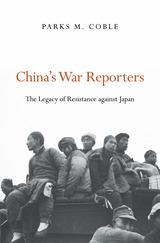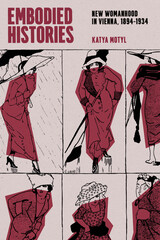
When Japan invaded China in the summer of 1937, many Chinese journalists greeted the news with euphoria. For years, the Chinese press had urged Chiang Kai-shek to resist Tokyo’s aggressive overtures. This was the war they wanted, convinced that their countrymen would triumph.
Parks Coble recaptures the experiences of China’s war correspondents during the Sino–Japanese War of 1937–1945. He delves into the wartime writing of reporters connected with the National Salvation Movement—journalists such as Fan Changjiang, Jin Zhonghua, and Zou Taofen—who believed their mission was to inspire the masses through patriotic reporting. As the Japanese army moved from one stunning victory to the next, forcing Chiang’s government to retreat to the interior, newspaper reports often masked the extent of China’s defeats. Atrocities such as the Rape of Nanjing were played down in the press for fear of undercutting national morale.
By 1941, as political cohesion in China melted away, Chiang cracked down on leftist intellectuals, including journalists, many of whom fled to the Communist-held areas of the north. When the People’s Republic was established in 1949, some of these journalists were elevated to prominent positions. But in a bitter twist, all mention of their wartime writings disappeared. Mao Zedong emphasized the heroism of his own Communist Revolution, not the war effort led by his archrival Chiang. Denounced as enemies during the Cultural Revolution, once-prominent wartime journalists, including Fan, committed suicide. Only with the revival of Chinese nationalism in the reform era has their legacy been resurrected.


A common generalization about the Nationalist Government in China during the 1927-1937 decade has been that Chiang Kai-shek's regime was closely allied with the capitalists in Shanghai. This book brings to light a different picture--that Nanking sought to control the capitalists politically, to prevent them from having a voice in the political structure, and to milk the wealth of the urban economy for government coffers. This study documents major political conflicts between the capitalists and the government and demonstrates that the regime gradually suppressed the main organizations of the capitalists and gained control of many of their financial and industrial enterprises.
This is the first systematic examination of the political role of the Shanghai capitalists during the Nanking decade. A number of related issues--the operation of the government bond market, the role of the Shanghai underworld and its ties to Chiang Kai-shek, the personalities and policies of key government officials such as TV. Soong and H.H. Kung, the Japanese attempt to control the economic policies of the Nanking government, and the growth of "bureaucratic capitalism"--are brought into focus.

A common generalization about the Nationalist Government in China during the 1927-1937 decade has been that Chiang Kai-shek's regime was closely allied with the capitalists in Shanghai. This book brings to light a different picture--that Nanking sought to control the capitalists politically, to prevent them from having a voice in the political structure, and to milk the wealth of the urban economy for government coffers. This study documents major political conflicts between the capitalists and the government and demonstrates that the regime gradually suppressed the main organizations of the capitalists and gained control of many of their financial and industrial enterprises.
This is the first systematic examination of the political role of the Shanghai capitalists during the Nanking decade. A number of related issues--the operation of the government bond market, the role of the Shanghai underworld and its ties to Chiang Kai-shek, the personalities and policies of key government officials such as TV. Soong and H.H. Kung, the Japanese attempt to control the economic policies of the Nanking government, and the growth of "bureaucratic capitalism"--are brought into focus.
READERS
Browse our collection.
PUBLISHERS
See BiblioVault's publisher services.
STUDENT SERVICES
Files for college accessibility offices.
UChicago Accessibility Resources
home | accessibility | search | about | contact us
BiblioVault ® 2001 - 2024
The University of Chicago Press









